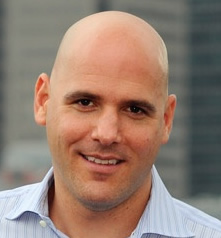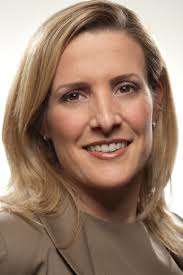Happy Wednesday morning, everyone!
—–
Top News in the A.M.
Yay? Beginning in September, companies can begin testing their autonomous vehicles on public roads, the California DMV announced yesterday.
Ebay is telling users this morning to change their passwords.
—–
VC Brian Hirsch: New York is Just Fine, Thank You
Brian Hirsch founded the New York-based venture arm of Greenhill & Co., then, in 2011, Tribeca Venture Partners, which is managing a $65 million debut fund. Hirsch knows the New York tech scene, in other words, and he’s a little exasperated by recent reports that it isn’t all it’s cracked up to be. Yesterday, we chatted by phone about what he’s seeing in the trenches.
We’ve been discussing differences between what’s happening in New York and the Bay Area. One burgeoning trend out here, apparently, are rounds where one investor tries writing a check for an entire seed round, instead of pulling in a handful of co-investors. Have you seen this happening in New York?
I’m not seeing it . . .but I’ve heard of things like that happening, mostly [involving] larger funds that want more control. I do wonder if there have been more learnings by those involved in party rounds about the increased competition at the table when it’s time to do [the startup’s] follow-on funding. [These new efforts] could also be tied to ownership. Smart investors are starting to understand that you can have a lot of great companies in your portfolio, but if you own one percent of [each], it may not move the needle. It’s still too early to know if these seed-only funds really [produce returns]; the challenge of the model is that you wind up owning more of your worst companies and less of your good ones.
You’ve backed 15 companies at the Series A level with your new fund. Have Series A rounds begun to balloon to Series B size, as in the Bay Area?
No. There’s just a lot more capital there and funds tend to be larger and much more competitive than here. If you’re looking to raise a Series A round here, there are just five to 10 funds that you’re going to go to that consistently lead or co-lead Series A rounds.
For good deals [locally], there’s always some competition, but we’ve put out 18 term sheets since [founding Tribeca] and we have 17 of those companies in, or about to be in, our portfolio. The one [outlier] was a situation where another fund was 70 percent higher in valuation, and even in that case, the investor invited us into the round, and we chose not to do it. We haven’t been blown out of a deal.
This is purely anecdotal, but I hear less about West Coast VCs canvassing New York. What’s your experience been like this year? Are you seeing the same level of enthusiasm from those investors?
They’re here. Accel and NEA opened offices and they do occasional investments here. But the power center is Silicon Valley, and when 95 percent of your time is spent in one market and 5 percent in another, it’s hard to make an impact. You really have to be living in a community to be networked. Most – if not all – of the out-of-state funds haven’t hired someone who has been active in the market here for 15 to 20 years because there aren’t that many, and those who do have that background have opened our own firms. [None of us] wants to be part of a West Coast firm that decides New York is great today but might change its mind in five years.
Tech investor Chris Dixon, who long lived in New York and now lives primarily in California has reportedly said of New York that it’s about applying, not inventing, new technologies at this stage in its evolution as a tech hub. Do you agree?
I think if you drink enough of the water, this Silicon Valley stance somehow becomes ingrained. I do agree that some really hard-core tech — storage networking technologies and semiconductors — might [remain West Coast industries], but with software – and that’s where 90 percent of the value will be in venture capital over the next 50 years — there’s no advantage between that market and this market, which is why every year, the gap between New York and Silicon Valley shrinks further.

New Fundings
AfterShip, a 2.5-year-old Hong Kong-based company whose shipment tracking app helps online retailers track shipments and send out delivery notifications, has raised $1 million in Series A funding from IDG-Accel China Fund, reports Tech in Asia. The funding comes almost two years after it received a seed round from the Australian online service providerBusiness Switch.
Autopilot, a three-year-old, San Francisco-based marketing automation platform (formerly known as Bislr), has raised $10 million in Series B funding led by Rembrandt Venture Partners. Other participants in the round included Southern Cross Venture Partners, Blackbird, and individual investors Tim Draper and Terry and Katrina Garnett.
Captora, a 1.5-year-old, Mountain View, Ca.-based marketing automation startup, has raised $22 million in Series B funding led by New Enterprise Associates. Earlier investor Bain Capital Ventures also participated in the round, which brings Captora’s total funding to $27.3 million, shows Crunchbase.
Chumbak Design Private, a three-year-old, Bangalore-based retailer known Chumbak, has received an undisclosed amount of Series B funding from Matrix Partners India reports the Hindu Business Line. The company’s earlier seed investor, Seedfund India, also participated in the round, says the outlet. Chumbak sells “India inspired” merchandise through its own kiosks and stores in Mumbai, New Delhi, Chennai, Bangalore, Hyderabad and Pune. It also sells goods online.
Clarizen, a nine-year-old, San Mateo, Ca.-based work collaboration and project management platform, has raised a new, $35 million, round of funding led by Goldman Sachs. Clarizen’s earlier investors also participated in the funding. The company has now raised $90 million altogether, including from Opus Capital, Benchmark Capital, Balderton Capital, Carmel Ventures, and DAG Ventures.
DataPad, a year-old, San Francisco-based visual data analytics company that’s targeting small business customers and individuals, has raised $1.7 million, including from Accel Partners, Google Ventures, Andreessen Horowitz, SV Angel, Ludlow Ventures, and angel investors.
FutureAdvisor, a 3.5-year-old, San Francisco-based registered investment advisory firm that affordably manages its users’ existing investment accounts using algorithms, has raised $15.5 million in Series B funding led by Canvas Venture Fund. Sequoia Capital, which provided the company with $5 million in Series A funding in 2012, also participated in the round. Rebecca Lynn of Canvas, who StrictlyVC profiled yesterday, has taken a board seat. (FutureAdvisor “has a better strategy” than competitors that ask customers to liquidate their assets and open brand-new accounts. The company “also has more traction,” she says. The WSJ has more here.)
HouseCall, a year-old San Diego-based company whose site and mobile app connects users to contractors, has raised $1.5 million in seed financing led by the real estate investment firm Canter Companies. The company has now raised $3 million altogether, including from e.ventures.
Housekeep, an eight-month-old, London-based housekeeping booking service, has raised $1 million in funding led by Pentland Group. TechCrunch has more on the very crowded space it’s entering here.
Indiegogo, the six-year-old, San Francisco-based crowdfunding platform, has raised a new, undisclosed amount of funding from some high-wattage investors, including billionaire Richard Branson, PayPal co-founder Max Levchin, Yahoo board chairman Maynard Webb, longtime investor Tim Draper, and Dawn Lepore, the former CEO of Drugstore.com (and long an executive with Charles Schwab before that). The round follows $56.5 million in previous funding for Indiegogo, whose investors include Insight Venture Partners, Institutional Venture Partners, Kleiner Perkins Caufield & Byers, MHS Capital, Metamorphic Ventures, and ff Venture Capital.
iSnap, a four-year-old, Sacramento, Ca.-based company that makes networked photo stations, has raised $1 million in Series A funding led by a group of unnamed individual investors from California and Europe.
Mango Health, a two-year-old, San Francisco-based company whose free mobile apps and enterprise software platform aim to entice people to take better care of their health, including by providing them with medication reminders, has raised $5.25 million in Series A funding from Kleiner Perkins Caufield & Byers. The round brings the company’s total funding to roughly $8.3 million. The company’s previous investors include Floodgate Fund, First Round Capital, Baseline Ventures, Bullpen Capital and angel investors.
MBA & Company, a nearly five-year-old, London-based project delivery platform that matches a “highly skilled and flexible workforce” with clients needing help, has raised $1.3 million in new funding from earlier investor MMC Ventures, reports the U.K. outlet Growth Business. Last year, MMC led a separate, $1.3 million round in the company, joined by Piton Capital and Cabides.
Powerhouse Dynamics, a 6.5-year-old, Newton, Ma.-based maker of monitoring management systems, has raised $6 million in Series B funding led by Point Judith Capital and Constellation Technology Ventures. Earlier investors SOSventures and Vision Ridge Capital also participated in the round, which brings the company’s total funding to roughly $11 million.
Snapdeal, the four-year-old, New Delhi-based Indian e-commerce site, has raised $100 million in a new funding round that that values the company at roughly $1 billion, according to WSJ sources. Investors in the financing include Temasek Holdings and BlackRock. With its new capital infusion, Snapdeal has raised roughly $350 million, including a $134 million round closed just in February from eBay, Bessemer Venture Partners, Intel Capital, Nexus Venture Partners, Saama Capital and Kalaari Capital.
Thumbtack, a 5.5-year-old, San Francisco-based online marketplace that matches users with local service professionals based on quotes they provide, has raised $30 million in Series C funding from Sequoia Capital and Tiger Global Management, says TechCrunch. The company has raised $48.2 million altogether, shows Crunchbase, including from Javelin Venture Partners, MHS Capital, and numerous individual investors such as Tim Draper, Hadi Partovi, and Cyan and Scott Banister.
Tradesy, a 4.5-year-old, Santa Monica, Ca.-based company whose online platform invites people to buy and sell new and gently used clothing, shoes and accessories, has raised $13 million in Series B funding led by Kleiner Perkins Caufield & Byers. Other investors in the round include Richard Branson, Rincon Venture Partners, Riverwood Capital, and Northgate Capital. Tradesy has raised $14.5 million to date, including from 500 Startups and Bee Partners.
VUV Analytics, a 4.5-year-old, Lakeway, Tx.-based company that develops vacuum ultraviolet optical technologies for use in the life and environmental sciences, has raised $5.8 million in Series A funding led by S3 Ventures of Austin.
—–
New Funds
The Irish government has unveiled a roughly $290 million venture capital fund for investing in Ireland-based life-sciences companies. Lightstone Ventures is partnering with Enterprise Ireland and the National Pension Reserve Fund to manage the fund. You can learn more here.
Project 11 Ventures, a Cambridge, Ma.-based seed and early stage investment firm that manages the TechStars Boston investment program, is looking to raise up to $30 million for a new fund, shows an SEC filing. According to the filing, the first sale has yet to occur. The three executives listed on the Form D are Robert Mason, Reed Sturtevant, and Katherine Rae.
Recruit Holdings of Tokyo has formed a 4.5 billion yen fund dedicated to corporate venture capital investments outside of Japan. VentureWire has more here.
River Cities Capital Funds, a Cincinnati-based growth equity firm focused on both healthcare and IT, has raised a $200 million fund — the largest in its history and the “biggest fund in Cincinnati this millennium,” reports the Cincinnati Business Courier. The firm raised its last fund, a $120 million pool of capital, in 2007.
—–
IPOs
Amphastar Pharmaceuticals, an 18-year-old, Rancho Cucamonga, Ca.-based specialty and generic pharmaceuticals company that makes injectable and inhalable treatments, has filed to raise $100 million. Its biggest shareholders include Applied Physics & Chemistry Laboratories, which owns 19.7 percent of the company, and Coller Capital, which owns 8.7 percent.
—-
Exits
BioProtein A/S, based in Stavanger, Norway, is being acquired by Calysta Energy, a three-year-old, Menlo Park, Ca.-based developer of natural gas conversion technology using methane for high value chemicals and fuels. Calysta has raised $8 million to date, including from Pangaea Ventures. Terms of the acquisition weren’t disclosed.
Bubbli, a four-year-old, Bay Area-based 3D photo stitching technology startup, has been acquired by Dropbox. Terms of the deal haven’t been disclosed, but the LinkedIn page of cofounder Ben Newhouse now lists him as employed by Dropbox’s “Ministry of Magic.” Bubbli had raised $2 million from August Capital.
Nimbic, a 7.5-year-old, Mountain View, Ca.-based electromagnetic simulation technology company that can accurately calculate complex electromagnetic fields, is being acquired by publicly traded Mentor Graphics to strengthen Mentor’s chip-package-board simulation portfolio. Terms of the acquisition weren’t disclosed. Nimbic has raised at least $11.5 million from investors, including WRF Capital, Austral Capital, and Madrona Venture Group.
Renesys, a 14-year-old, Hanover, N.H.-based Internet traffic monitoring company, has been acquired by Dyn, another Internet performance service company, for an undisclosed amount. Renesys doesn’t look to have raised venture capital; Dyn has raised at least $38 million, including from North Bridge Venture Partners.
SeeWhy, an 11-year-old, Boston-based real-time behavioral marketing company that optimizes website visitors’ paths to purchase, has been acquired by the German software company SAP for undisclosed terms. SeeWhy had raised at least $16 million, shows Crunchbase, including from Delta Partners, Scottish Investment Bank, Logispring, and Pentech Ventures.
Remember that yesterday, we mentioned that Twitter was considering buying the German music-streaming service SoundCloud? Right, well, not anymore, never mind.
—–
People
Smart, Uber. Yesterday, the New York Times reported that Ashwini Chhabra, deputy commissioner of New York City Taxi and Limousine Commission, is becoming Uber’s first head of policy development and community engagement.
Raanan Bar-Cohen, long a senior VP of Automattic (parent of the WordPress blogging platform) is leaving the company to become a venture capitalist, he announced yesterday in a blog post. Writing of his “seven incredible, fun, and rewarding years at Automattic,” Bar-Cohen said that he’s now off to become a general partner at Resolute Ventures, the early-stage venture fund founded by Mike Hirschland. (Last Friday, we told you about Resolute’s plans to raise a new, $40 million fund.) The two have known each other for close to a decade, said Bar-Cohen, adding that Hirschland, formerly with Polaris Partners, also sat on the board of Automattic for many years.
Dan Lyons, the former Newsweek writer and author of the hugely popular Fake Steve Jobs blog, will be helping to write the second season of HBO’s new comedy series “Silicon Valley,” reports Valleywag.
Kleiner Perkins Caufield & Byers has hired Scott Ryles as chief operating officer, reports Fortune. You can learn more here.
—–
Job Listings
Singularity University is looking for a managing partner. In February, the Silicon Valley think tank unveiled plans to raise a $50 million fund, fundraising for which was slated to begin in the second quarter of this year.
—–
Essential Reads
A lawsuit filed yesterday against Google accuses the tech titan of engaging in widespread fraud by canceling AdSense accounts just before they were due to pay out. It’s seeking class action status.
Fifteen-year-old Nathan Han has developed a machine-learning software tool to identify cancer threats from BRCA1 gene mutations and according to Intel, it has an accuracy rate of 81 percent.
A new report out of San Francisco’s Human Services Agency finds that in numerous ways, San Francisco has more extreme income inequality than some developing nations, including in sub-Saharan Africa.
—–
Detours
How cold weather affects your brain.
The Guardians, a photographic project by Vladimir Antaki.
Neil Degrasse Tyson’s best tweets.
—–
Retail Therapy
The world’s most expensive donut.
The world’s most expensive Rolex.
Be the first one to fly past the Rosewood in one of these babies.
—–
To sign up for StrictlyVC, click here. To advertise, click here.
 Micro VC Jim Scheinman of Maven Ventures is usually noodling on a new business idea, he tells me over coffee at The Battery, a private social club in San Francisco where various tanned VCs are seated opposite pale entrepreneurs in spacious black leather booths.
Micro VC Jim Scheinman of Maven Ventures is usually noodling on a new business idea, he tells me over coffee at The Battery, a private social club in San Francisco where various tanned VCs are seated opposite pale entrepreneurs in spacious black leather booths.




